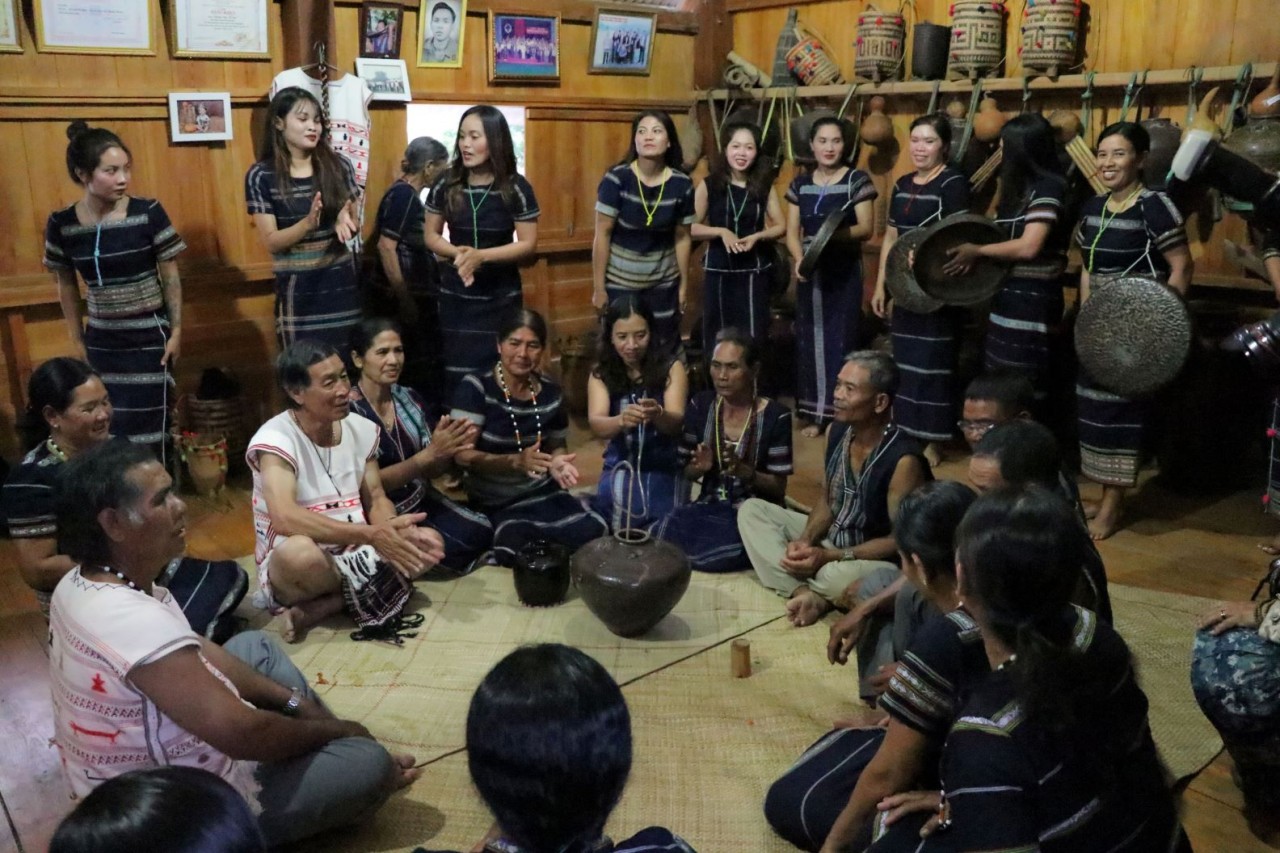
Lam Dong preserves culture of ethnic minorities
Latest
Preserving the sustainable cultural values of the ethnic minorities in the Central Highlands is one of the key issues in the strategy of preserving and promoting ethnic cultural values in the spirit of the 13th Party Congress. This is the ‘intrinsic resource and breakthrough momentum for socio-economic development and international integration’, especially meaningful for Lam Dong when some elements of the cultural identity of ethnic minorities in the area are at risk of being eroded due to the intersection, cultural intrusion from outside in the context of globalization and current international integration.
 |
| A performance of an artist group from Lam Dong province at the first Cultural Festival of Central Highlands Ethnic Groups on November 30, 2023. (Photo: VNA) |
Cultural diversity of ethnic minorities
Lam Dong is a southernmost mountainous province in the Central Highlands, with a total population of about 1.25 million people, with 43 ethnic groups living together, each with different historical origins. Among them, ethnic minorities account for about 298,000 people, making up 24% of the population. Based on their origins, the ethnic minorities in Lam Dong are divided into two groups that are distributed throughout all 12 districts and cities in the province, mainly concentrated in remote and isolated areas. This forms a community that is not uniform in terms of production level, socio-economic development, and cultural level, customs, and practices. The interspersed living conditions between these two ethnic minority community groups provide a favorable condition for learning, cultural exchange, enhancing knowledge in all aspects, and uniting to help each other develop.
The traditional cultural heritage of the ethnic minorities in Lam Dong province is extremely rich and diverse in both tangible and intangible cultural values.
In terms of intangible culture, the ethnic minority community in Lam Dong currently preserves many quite unique cultural values; these include Gong culture, Epic songs, Storytelling, Epic Poetry, Folk songs (Yal Yau), Folk dances, etc. Especially, the system of festivals is still quite rich, reflecting the diversity of polytheistic beliefs of the original Central Highlands ethnic minority groups such as: the New Rice Festival; the Rice Husking Ceremony; the Naming Ceremony for Newborns of the Ma people; the Worship of Agricultural Gods, especially, the Waterfront Ceremony is the most important spiritual festival of the K’Ho, Chu Ru tribes.
Regarding tangible culture, according to statistics, the entire province has 37 ranked relics; among them are 2 special national monuments, 20 national-level monuments, 16 provincial-level monuments; 14 scenic spots and 2 revolutionary historical monuments. Among them, some traditional villages are preserved and developed by ethnic minorities such as: Mulberry cultivation for silkworm rearing, pottery making, making Can wine, weaving brocade and traditional crafts such as: rattan weaving, silver ring casting, making crossbows, making gourd lutes, etc.
However, over time, the negative impact of the market economy, along with the rapid development of science, technology, and the Internet, has increased the influx of unhealthy external cultures, causing the culture of the indigenous ethnic minorities in Lam Dong province to show signs of decline and gradually disappear. According to the Department of Culture, Sports and Tourism of Lam Dong, the indigenous ethnic minority community still preserves some cultural heritage, especially folk festivals and traditional cultural festivals. However, some festivals with a high community structure have declined a lot and need to be restored, in order to preserve and promote the unique local cultural values.
Preserving cultural values
Recognizing the importance and significance of the work of preserving, promoting, and advertising the cultural values of ethnic minorities in the context of globalization, the People’s Committee of Lam Dong province has issued the project “Preservation and development of the cultural space of the Central Highlands gongs of the ethnic groups in Lam Dong province by 2020”; cultural development strategy by 2022; the project “Preserving, promoting the cultural identity of indigenous ethnic groups, restoring and developing traditional craft villages associated with tourism activities in Lam Dong province for the period 2018-2022, with an orientation to 2030”; set up a project to submit to the Ministry of Culture, Sports and Tourism for recognition of “Chu Ru Ethnic Cultural Village” (in Pro commune - Don Duong district), with an investment construction cost of over 7 billion VND.
Through the projects approved by the Provincial People’s Committee, the Department of Culture, Sports and Tourism has directed its subordinate units to intensify activities towards the grassroots level. In this process, in collaboration with local authorities and the Department of Culture and Information, surveys have been conducted to assess the current state of management, preservation and exploitation of cultural heritage, and landmarks serving tourism, etc. Hence, timely rectification has been made to address the situation of businesses that manage and exploit tourist-serving landmarks but lack investment and operate ineffectively. Measures have also been taken to prevent the degradation and damage of some monuments.
In implementing the Government’s project on supporting the restoration of traditional festivals of ethnic minorities, in recent years, the Department of Culture, Sports and Tourism has invested in restoring 10 typical festivals of the indigenous ethnic minorities that have faded away, such as: The Po Thi Festival (of the Chu Ru and K’Ho people in Duc Trong district), the Nho Wer Festival (of the K’Ho Sre group in Di Linh district), the Bok Chu-bur Festival (of the Chu Ru people in Don Duong district), the ritual of worshipping terraced rice of the Ma people in Bao Lam; the Nho rohe Festival (bringing rice to the warehouse of the K’Ho people in Lam Ha district); the wedding ceremony of the K’Ho people in Lac Duong district, etc.
 |
| Reenactment of the traditional wedding ceremony of the K’ho Sre people with the participation of 60 artisans and local community actors - one of the activities in response to the Golden Tourism Week of Lam Dong province in 2023. (Photo: VNA) |
In mid-December 2022, implementing the project “Preserving and promoting the beautiful traditional cultural values of ethnic minorities, associated with tourism development”, the Department of Culture, Sports and Tourism invested 20.64 billion VND to restore and preserve two traditional villages of the K’Ho people in Lac Duong and Di Linh districts; the funding was allocated from the national target program on “Socio-economic development of ethnic minority and mountainous areas in Lam Dong province, 2021-2025 period”
In addition, the Department of Culture, Sports and Tourism has also implemented many diverse activities, aimed at educating the consciousness of the ethnic minority community in preserving and promoting the ethnic cultural identity, especially the younger generation. Every year, the Department of Culture, Sports and Tourism organizes the Provincial Gong Culture Festival (now known as the “Cultural and Sports Festival of the Ethnic Minority Region”).
The Department of Culture, Sports and Tourism also focuses on organizing gong teaching classes in communes and districts where many K’Ho, Ma, and Chu Ru people live. To date, more than 100 gong teaching classes have been organized, attracting nearly 2,000 male and female teenagers from ethnic minorities to participate. Currently, the entire province has more than 100 gong teams, and 5 new gong teams have been established to serve tourism.
The effective preservation and promotion of cultural values have contributed significantly to the achievements in socio-economic development as well as the richness and diversification of the spiritual life of the ethnic minorities in the province, contributing to the overall development of the locality. From here, the self-management, awareness of roots, and community solidarity in the villages and communes of the ethnic minorities in Lam Dong province are maintained and promoted.

















